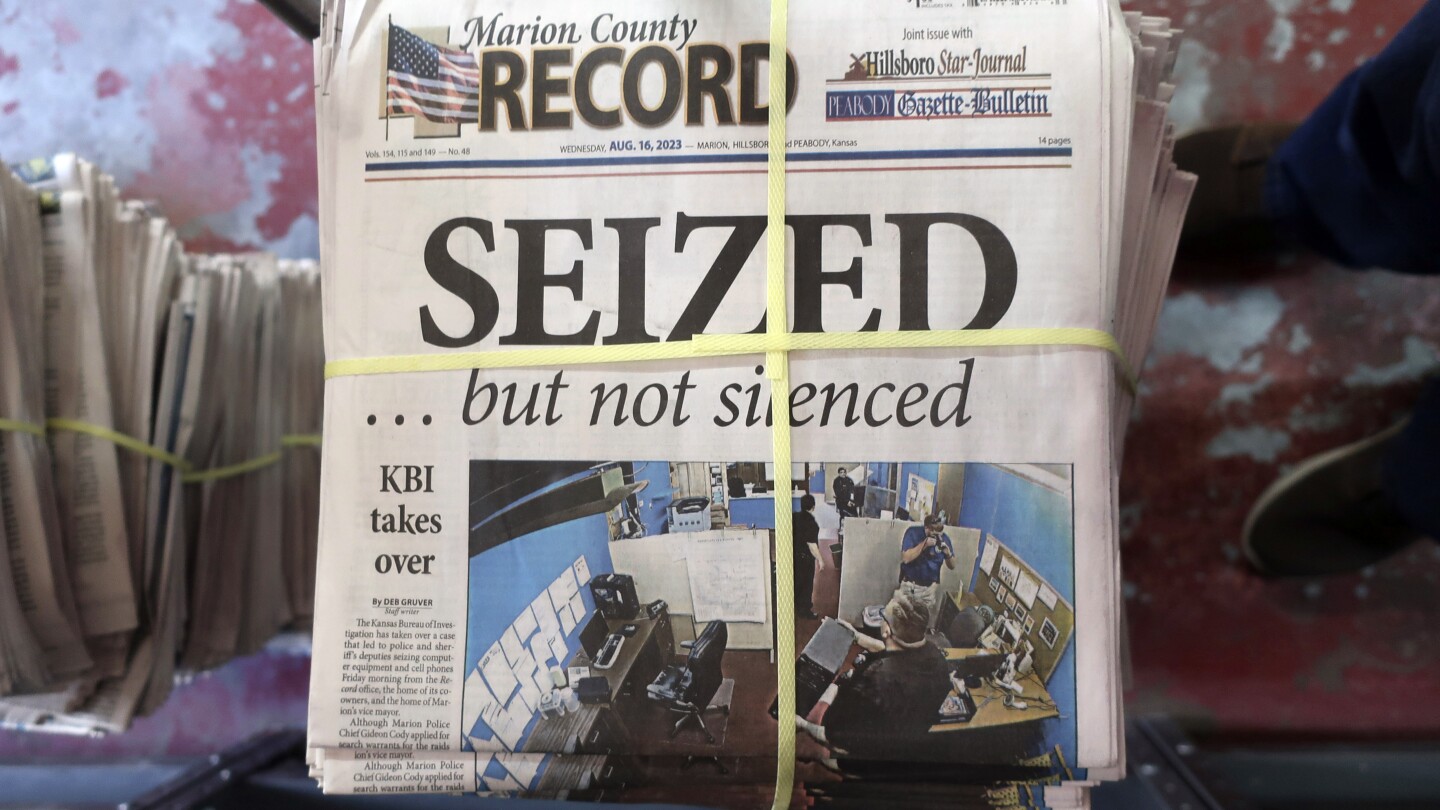- cross-posted to:
- [email protected]
- cross-posted to:
- [email protected]
The police chief who led a highly criticized raid of a small Kansas newspaper has been suspended, the mayor confirmed to The Associated Press on Saturday.
Marion Mayor Dave Mayfield in a text said he suspended Chief Gideon Cody on Thursday. He declined to discuss his decision further and did not say whether Cody was still being paid.
Voice messages and emails from the AP seeking comment from Cody’s lawyers were not immediately returned Saturday.
The Aug. 11 searches of the Marion County Record’s office and the homes of its publisher and a City Council member have been sharply criticized, putting Marion at the center of a debate over the press protections offered by the First Amendment to the U.S. Constitution.



Yeah well, I didn’t know what you were trying to say.
Okay, a nexus issue, that’s something, still not a misrepresentation, it’s a scope and nexus issue. I have to think about that one and maybe another look at the warrants. That’s on the judge, as your quote says, it “essentially threw Judge Viar under the bus.”
That’s just splitting hairs.
Never mind the “may have”; he actually did misrepresent the facts:
The police chief claimed the reporter (Phyllis Zorn) could only obtain the driver’s record by impersonating the “victim” or lying about the reasons the record was being sought.
Zorn said an unidentified source gave her a copy of the driver’s record, which she then verified on a state public records database. This directly contradicts the police chief’s accusations.
The newspaper said it didn’t run the story because they felt their source’s motives were questionable. Then after the raid, they did because it was relevant to the raid.
According to the newspaper’s attorney, Bernie Rhodes:
Source
The chief still didn’t write the affidavit.
According to the newspaper’s attorney, who of course says it was legal! Nobody is more biased on this question. Good try though.
I read the stature and there are 14 reasons that can allow someone to look up public driving records. The journalist didn’t meet any of them.
They are listed here in subsection b items 1 to 14. Which one do you think the paper fell under?
It’s the same list that I have to check off as an attorney when I use a public record databases such as LexisNexis. Here they are:
https://www.law.cornell.edu/uscode/text/18/2721
If you read carefully, the newspaper’s argument is that the law intends to make driving records records publicly available, so the paper was allowed to access the records.
That’s true if they are released to the paper under FOIA. These records contained personal information on private individuals, so they were not foiable, and were publicly available only if one of the 14 rights of access from that federal statute applies. And indeed there was no FOIA request. So, the journalist either impersonated the subject of the record, or falsely certified to one of the rights of access enumerated in the statute.
You keep moving the goalposts. First it’s a misrepresentation made the warrant invalid, then it’s that the warrant was too broad, now it’s that the conduct alleged in the warrant is true but was not actually criminal. Hmm.
Bullshit.
The judge allowed the warrant based on the information she got from the police chief, which is questionable and will have to be sorted out in court, period.
And this memo he issued for “interested media outlets” outlines the how and why.
If you’re an attorney and feel so strongly about this, perhaps you can represent the (now former) police chief, pro bono.
Once again, the police chief did not write the warrant affidavit. The judge didn’t do anything based the police chief. The officer that applied for the warrant did though, he referred the chief to internal affairs after the driving record somehow implicated him in a crime. If he committed a crime, charge him.
The memo doesn’t explain any reasoning or recite any facts. It merely quotes some statutes and then highlights some language. Each time, it conveniently stops the highlighting right before the list of reasons why many driving records are not public record except for cause, defined under the statute. The reporter still doesn’t meet any of the valid rights of access.
For example, the lawyer highlighted the right of access that applies to statistical research. The reporter was not doing statistical research, so why is it highlighted? Seems the only reason is to try and confuse people.
The lawyer is saying that because many driving records are disclosable for cause, all of them are. Or, that because the statute’s purpose is to make certain driving records public, the reporter was free to submit false information to obtain the records. They are shit arguments.
I remain unconvinced.
Nah, I don’t represent cops or scabs.
As I said before, if you think the judge and police chief are in the right here, fine; you have a right to your opinion.
Unless you’re the judge in the upcoming cases, who cares?
Edit: About the next comment – straw man my ass. I restated, word for word, exactly what I had stated eight posts above.
Also, more recent audio from body camera footage shows the police chief was searching for information about himself during the raid, which may have been his motivation for the raid in the first place.
Now whose putting up a straw man?
deleted by creator